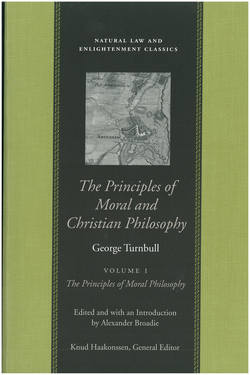Читать книгу The Principles of Moral and Christian Philosophy - George Turnbull - Страница 8
На сайте Литреса книга снята с продажи.
ОглавлениеA NOTE ON THE TEXT
In preparing Turnbull’s text for this edition my approach has been minimalist. I have corrected manifest printer’s errors but have not modernized Turnbull’s eighteenth-century spelling nor corrected what may be plain spelling mistakes. The 1740 edition contains a list of errata, and I have silently incorporated the corrections into the text.
I have, however, changed the placement of some footnote markers, especially where they had been placed before the first word of a quotation. In the original text, Turnbull used repeated alphabetical sequences to mark his footnotes; but his omissions, repetitions, and interspersed symbols cause confusion, and so I have chosen to replace his footnote markers with a, b, etc., starting the sequence anew with each page of this edition. My additions to Turnbull’s footnotes are placed in square brackets within the latter. My own notes are marked by arabic numerals. I have also altered the placement of the table of contents. In the original text Turnbull’s annotated contents are placed at the end of each volume. I have moved them to the front of the volumes, where they now precede their respective texts, and have retained the original page numbers. Page breaks in the 1740 edition are indicated in this edition by the use of angle brackets. For example, page 112 of the 1740 edition begins after<112>.
The work includes many Latin quotations. Of these, some are taken from works that were originally in Latin, others from works that were translated into Latin from Greek. For the former, I have reproduced translations from the Loeb Library editions wherever possible. For the latter, I know of no published translations of the Latin editions. In these cases I have given my own translations of the Latin translations that Turnbull used. There are sufficient differences between the Greek text and the Latin translations to prompt my decision to offer a translation of the text that Turnbull certainly read, namely the Latin one, rather than the Greek text, which he may not have known except in Latin translation.
Turnbull seems often to have relied on his memory for biblical passages, whether quoted or paraphrased, and I have silently corrected obvious errors of reference. However, it is not always plain whether Turnbull has misidentified a source of a paraphrase or has found a sense that eludes me in the verses at issue. In such cases I have let his references stand. I have used the King James version.
The many quotations from Pope, except for the translations of Homer, are identified in Alexander Pope, Poetical Works, edited by Herbert Davis (Oxford: Oxford University Press, 1966). Although there are some verbal differences between the edition Turnbull used and the modern edition, which is based on the Warburton edition of 1751, I have not annotated the differences.
A bibliography of works used in both volumes is found at the end of volume 2.
